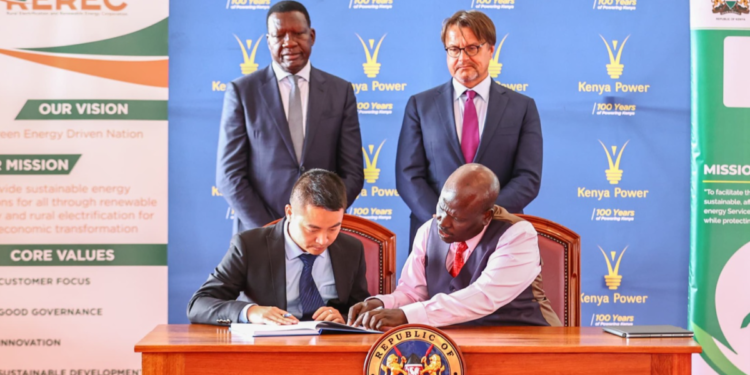The government has embarked on a new phase of its ambitious Last Mile Connectivity Project, investing €180 million (KES 27 billion) to connect 280,000 additional households across 32 counties. This significant initiative is co-funded by the Kenyan government, the French Development Agency (FDA), the European Union, and the European Investment Bank (EIB).
Speaking at the contract signing ceremony at State House, President William Ruto hailed the project as a critical step towards achieving universal electrification by 2030.
“This event marks an immense milestone on Kenya’s journey towards achieving universal access to electricity,” said Ruto. “Our commitment, alongside the invaluable support from our development partners, is transforming our vision into reality.”
Since its inception, the Last Mile Connectivity Project has played a transformative role in bridging the urban-rural divide. By extending the national grid to underserved areas, the initiative aligns with Kenya’s broader Bottom-Up Economic Transformation Agenda, significantly boosting national productivity and inclusivity.
President Ruto detailed the project’s impressive progress over the past decade, highlighting the increase in the national electrification rate from 27% in 2013 to over 75% today. “This means that 9.6 million Kenyan households are now connected to electric power,” he noted, emphasizing the profound impact on various sectors, including agriculture, education, and healthcare.
The newly announced phase, funded by KES 2.5 billion from the Kenyan government, is complemented by substantial contributions from international partners. “I wish to express profound appreciation to the FDA, EU, and EIB for their consistent support,” Ruto said, acknowledging the crucial role of these partners in the project’s success.
In addition to the current phase, Kenya is working on another KES 22 billion connectivity programme in partnership with the Agence Française de Développement (AfD) and the Kingdom of Saudi Arabia, aiming to connect more than 270,000 customers. These initiatives underscore Kenya’s commitment to achieving 100% electricity connectivity by 2030.
The economic implications of enhanced electricity access are significant. The project supports the Hustler Economy by benefiting Micro, Small, and Medium Enterprises (MSMEs), which are the backbone of Kenya’s economy. “Reliable power enables businesses in rural areas to flourish, contributing significantly to our GDP and creating numerous job opportunities,” Ruto explained.
Moreover, the initiative has revolutionized the agricultural sector, powering irrigation systems and agro-processing units, thereby boosting productivity and ensuring food security. “By connecting millions of households to the power grid, we have not only illuminated homes but also empowered communities and enhanced educational opportunities,” Ruto added.
The Last Mile Connectivity Project remains a cornerstone of the nation’s economic and social development strategy. “Universal access is fundamental to achieving economic inclusivity,” Ruto concluded, reinforcing the project’s pivotal role in shaping a prosperous future for all Kenyans.












